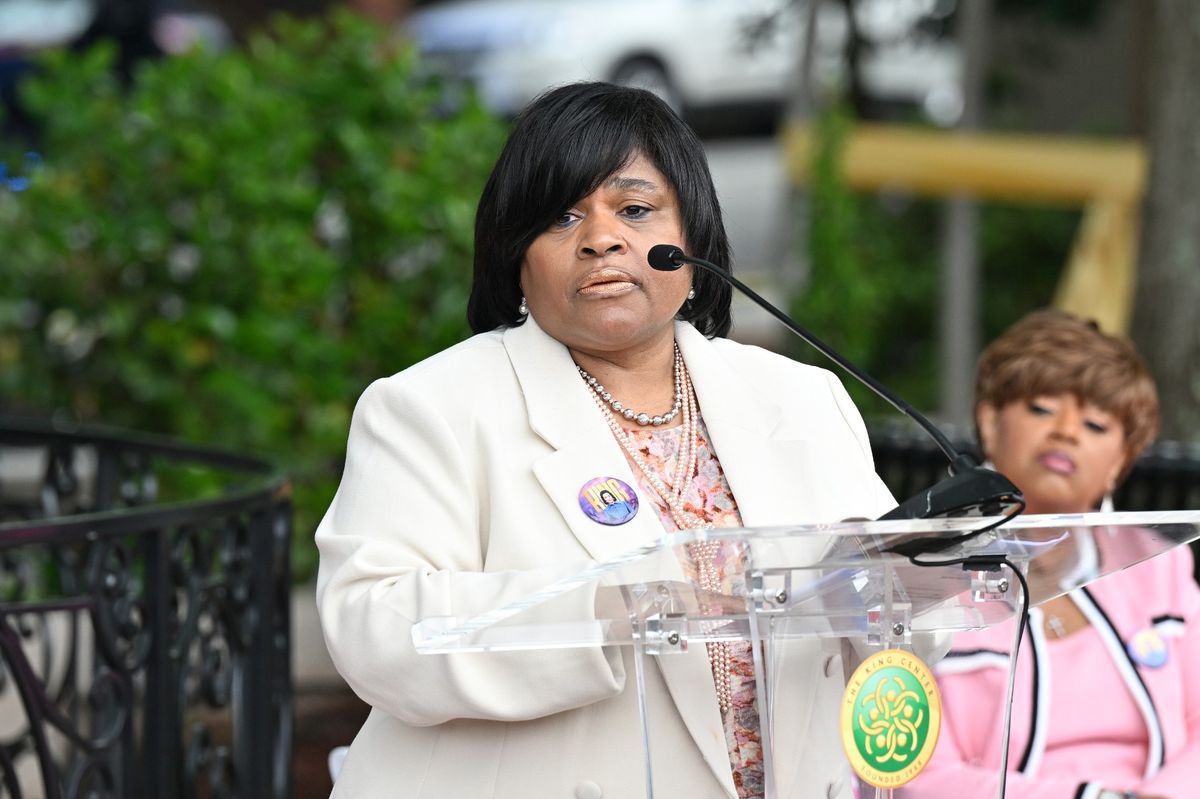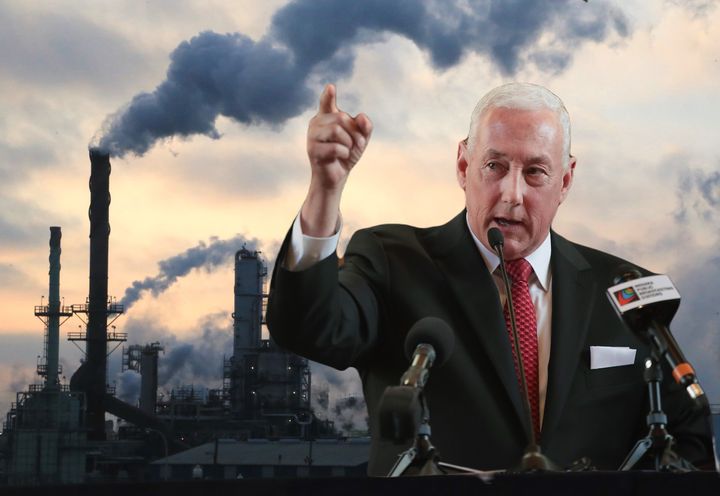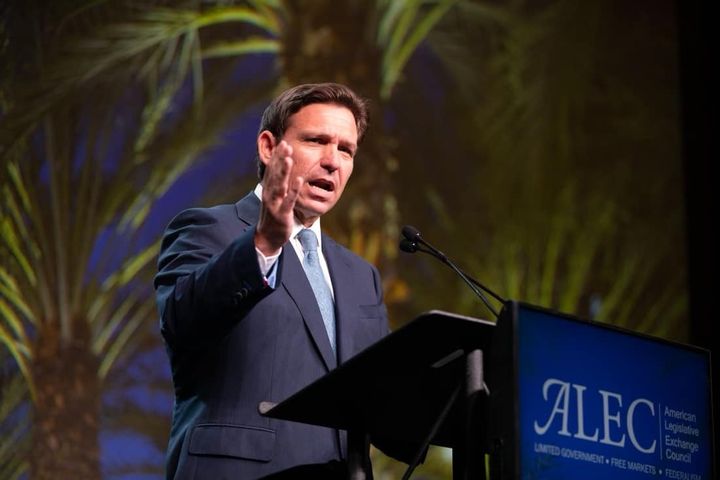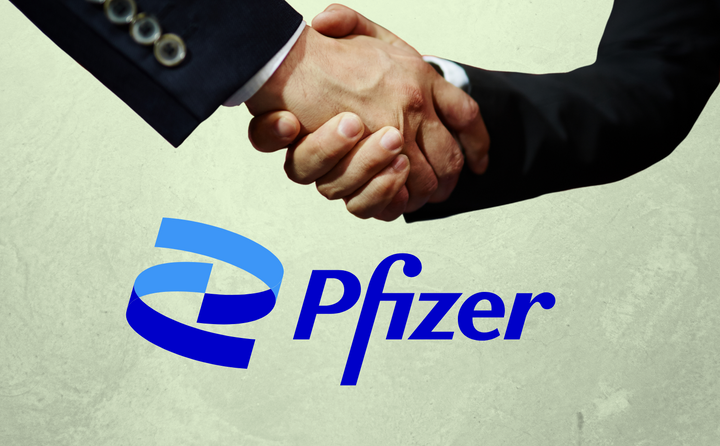Democratic National Convention Chair’s Firm Helps Companies Block Labor Laws
Dewey Square Group, where Minyon Moore leads State and Local Affairs, was paid millions of dollars last year by a Lyft-funded industry group fighting state labor protections.

President Biden has a go-to line in speeches, saying he’s “the most pro-union president you’ve ever seen.” Next year’s Democratic National Convention, though, will be run by an executive of a public affairs firm that is helping companies such as Lyft and Tenet Healthcare fight labor protections.
Last week, Minyon Moore, a principal at public affairs and consulting firm Dewey Square Group (DSG), was announced as the chair of the 2024 Democratic National Convention. As chair, Moore will lead the team of Biden allies planning for the event that will be held in her home city of Chicago.
At DSG, which celebrated her appointment, Moore “leads the State and Local Affairs and Multicultural Strategies practices with clients ranging from the Fortune 100 to startup non-profits seeking counsel for developing strategies that address emerging consumer markets and achieve public policy goals,” wrote the Democratic National Committee (DNC). A longtime party insider, Moore is currently a co-chair of the DNC Rules and Bylaws Committee and was CEO of the DNC in 2001.
To solidify its pro-labor image in the presidential race, the Biden-Harris re-election campaign has reached a so-called peace agreement with Chicago unions ahead of the convention. DSG’s roster of corporate clients, however, have led lobbying and public relations campaigns against major labor law reforms that Democrats are sure to invoke again next year. The DNC did not respond to a request for comment on Moore’s state policy consulting, and DSG did not respond to requests for comment on the firm’s corporate clients.
Opposing Gig Worker Protections
Last year, DSG scored a seven-figure payday from its client Lyft as part of a Massachusetts campaign to prevent state lawmakers from classifying gig workers as independent contractors. Then-Attorney General Maura Healey, a Democrat who was elected governor last year, brought a suit against Uber and Lyft in 2020 arguing the companies were violating labor laws by treating drivers as independent contractors and accusing them of “unfair and exploitative practices.”
In response, Lyft and other companies launched a public influence campaign—following the playbook the company had developed with a high-spending California ballot initiative campaign, and a New York lobbying push—supporting a proposed Massachusetts ballot initiative that would classify app-based drivers as independent contractors, among other policies. Lyft contributed $14 million to the state group backing the initiative, in what the Boston Globe called the largest political donation ever in Massachusetts.
The Lyft-funded group, named Flexibility and Benefits for Massachusetts Drivers, paid DSG more than $2.6 million in consulting fees and space rental starting in October 2021, according to data from the Office of Campaign and Political Finance, making DSG one of the group’s top vendors. In addition, DSG served as the middleman for $2.5 million spent by the group on database services with the Democratic Party software NGP/VAN as subvendor. Last summer, a Massachusetts court threw out the measure and prevented it from appearing on ballots—but the group has registered a new committee to put the question in front of voters in 2024.
Also last year, Lyft helped form a trade group, the Flex Association, to stop federal Democrats’ push to reclassify gig workers as employees through provisions in the PRO Act, standing for “Protecting the Right to Organize.” Among other things, the PRO Act would make misclassifying an employee as a contractor a violation under the National Labor Relations Act, and would allow workers and the National Labor Relations Board to determine union election procedures.
The PRO Act passed the Democratic-controlled U.S. House in 2020 and 2021, but was not brought up for a Senate vote. President Biden campaigned on his strong support for the PRO Act and called on Congress to pass it, but the bill, opposed by the powerful U.S. Chamber of Commerce and business groups, was certain to face a Republican filibuster in the Senate and was not advanced out of committee in the 117th Congress, with its narrow Democratic control in the Senate.
Lyft and gig economy companies also unleashed massive spending campaigns over the past few years to block labor laws in California and New York.
A 2019 California law known as AB5 set standards for classifying workers as independent contractors or employees, though parts of the law targeting ride-hailing and delivery companies were overturned by a 2020 ballot measure known as Prop 22 and are the subject of ongoing legal challenges.
To defeat the California law that would enable drivers to join unions, Lyft and gig economy companies shelled out a record-breaking $200 million backing the ballot initiative, then brought a similarly heavy-spending lobbying and donations effort to New York State to head off a potential legislative push from Democrats there. During the first three months of the Biden administration, gig economy companies racked up $1 million in federal lobbying spending to beat back the PRO Act, and last year Lyft and other companies dropped another $1 million on ads opposing the PRO Act.
Lyft’s federal lobbying continues this year on policy matters regarding the classification of independent workers, as well as the “proposed DOL rule regarding independent contractors and nominations,” in its talks with Congress.
The Department of Labor rule mentioned by Lyft is expected to be finalized this year and is similar to the California law that was supported by Julie Su, the Biden administration’s acting secretary of labor, in her stint as a state official. The Flex Association has urged the federal rule be withdrawn and the trade group’s CEO Kristin Sharp came out staunchly against Su’s nomination in a May op-ed.
Lyft’s board includes former Obama adviser Valerie Jarrett, and former Secretary of Transportation Anthony Foxx previously worked as its chief policy officer. Jeremy Bird, formerly national field director for the Obama-Biden re-election campaign, took over the title of chief policy officer in January 2022.
Other Corporate Clients
McDonald’s is another DSG client displayed on the firm’s website. As of its most recent political disclosure last year, the fast food giant was a member of trade group the National Restaurant Association, which is now leading the battle against a California labor law, the FAST Act, signed last year by Gov. Gavin Newsom on Labor Day. The bill, a top union priority, established a 10-member Fast Food Council to oversee working conditions in fast food chains and lift workers’ wages, now being challenged by a statewide ballot measure expected in November 2024. In the op-ed along with Sharp, the restaurant industry group’s Sean Kennedy, executive vice president of public affairs, mentions Su’s support for the FAST Act and AB5 as driving their opposition to her nomination.



